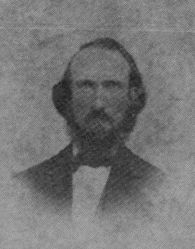 In Virginia’s Shenandoah Valley, the forces of Union General Philip Sheridan chase the retreating forces of Confederate General Jubal Early, following the Federals’ victory over the Rebels at Winchester the day prior.
In Virginia’s Shenandoah Valley, the forces of Union General Philip Sheridan chase the retreating forces of Confederate General Jubal Early, following the Federals’ victory over the Rebels at Winchester the day prior.
As the chase takes place, Confederate president Jefferson Davis departs from Richmond en route to Georgia to visit Confederate General John Bell Hood and his defeated and demoralized Army of the Tennessee. Davis hopes to help Hood find a way to re-capture Atlanta from Union forces.
Meanwhile in Georgia, Confederate calvary strike in the rear of Union lines north of Atlanta, attempting to cut Union General William T. Sherman‘s supply lines to Chattanooga. Skirmishing takes place at Cartersville. While the Rebel attacks are annoying to Sherman, Union soldiers thwart the enemy efforts to cut off their supply lines.
While Davis heads down to Georgia and Confederate forces try to put pressure on Sherman, white Georgia Baptists ponder the future of their state and nation. Those reading this week’s Georgia Baptist Christian Index are encouraged, by editor Samuel Boykin writing from Macon (where many Baptists from Atlanta are now refugees), to fight bravely and courageously. Boykin’s closes his admonition thus:
If it be asked, What is the future of our Confederacy? we answer, that our future is to fight–to fight while an enemy pollutes our soil–to fight as long as they deny our rights–to fight until independence is achieved–to fight as long as we have men willing to battle for homes, for children, for liberty, for all they hold dear. We have suffered too much, endured too much, lost too much, to fail now in the achievement of all for which such a great price was paid. Hope still looms up grandly and gloriously before us; liberty and honor and happiness and prosperity still lure us on to the mighty and magnificent prize for which we struggle; and while such is the case–while success is almost in our grasp, shall we ignominiously falter? Never. Southerners! be stout of heart–be firm–be unfaltering. Dare what seems a cruel lot. It only leads to the greater glory. ‘Tis the brave, the unyielding, the determined, that fortune favors. But deserve her smile by your gallantry, and all she has is yours.
Boykin’s confident words are easy, for he has neither served in uniform nor witnessed battlefield action. Yet rhetorically whip up the confidence and courage of Confederate soldiers and home front guards he must, for the fortunes of elites like Boykin are all built upon black slavery. Should the common men folk soldiery who are fighting the abolitionist enemy fail to shore up the rapidly faltering Confederacy, the future of large-scale slaveholders, and of those whose wealth is derived from the world of slaveholders, is one of financial doom and social ruin.
Such dark prospects are too much for Boykin and his fellow elites to imagine possible. They must believe until the very end that the slave-based Confederacy cannot be conquered.
Sources: Third Battle of Winchester (link); Battle of Olequon (link); 150 Minnesota Civil War, September 20, 1864 (link); “Civil War Heritage Trails” Newsletter, September 2014, No. 27 (link); “Notes on the Times,” Christian Index, September 16, 1864


